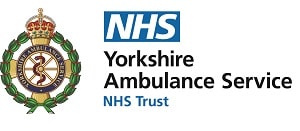Yorkshire Ambulance Service Supports World Sepsis Day
11 September 2017
Yorkshire Ambulance Service NHS Trust (YAS) treats more than eight patients every day with life-threatening sepsis.
The condition is a rare but serious complication of an infection and without quick treatment sepsis can lead to multiple organ failure and death. Similar to major trauma or stroke, the speed and appropriateness of therapy administered in the initial hours after sepsis develops are likely to influence the outcome.
YAS has worked with hospitals across Yorkshire to develop a pre-hospital screening tool and improve the awareness, identification and management of sepsis patients.
Last year YAS dealt with over 3,000 patients with sepsis and provided life-saving treatment and a rapid transfer to hospital to ensure they received the best care possible.
Dr Steven Dykes, Deputy Medical Director at YAS, said: “Every minute counts and acting quickly can save lives. If you develop any of these symptoms you should seek medical help urgently:
- Slurred speech
- Extreme shivering or muscle pain
- Passing no urine (in a day)
- Severe breathlessness
- “I feel like I might die”
- Skin mottled or discoloured.
“Just ask ‘Could it be sepsis?’ It’s a simple question but it could save lives.”
YAS is supporting World Sepsis Day on 13 September 2017 when people across the world unite in the fight against sepsis. Every year, 44,000 people die in the UK from the silent killer.
Dr Helena Parsons, Consultant Microbiologist and Clinical Lead, Sheffield Teaching Hospitals NHS Trust, said: “Identifying patients with sepsis early is important for Sheffield Teaching Hospitals. We have worked with YAS on a pre-alert system to be ready to manage patients with sepsis as quickly as possible to improve patient outcomes.”
Dr Stuart Nuttall, Consultant in Emergency Medicine at Leeds Teaching Hospitals NHS Trust (LTHT) and Medical Lead for the LTHT Sepsis Group, said the YAS pre-hospital screening tool had resulted in a significant increase in the number of sepsis patients receiving antibiotics within one hour.
He added: “By working together with emergency departments across the region, YAS's sepsis pathways have ensured appropriate early recognition and treatment of sepsis through pre-hospital fluids and pre-alerts for patients with red flag sepsis1.
“By using common communication tools such as the National Early Warning Score2 and red flag sepsis features, YAS has improved the telephone pre-alert information and hand-over of patient care between the pre-hospital and hospital environments. The effect of this has been that we can prioritise care to red flag sepsis patients in a timely manner which has seen our time to delivery of antibiotics for this group of patients fall from 90 to 60 minutes with more than 70% of patients now receiving antibiotics within one hour, up from 20% in August 2016. We look forward to continuing our work with YAS to provide the best care possible for sepsis patients."
Note to editors
- Red flag sepsis is a definition from the National Sepsis Trust which identifies a set of easy-to-identify clinical parameters, the presence of one of which in the context of infection, defines sepsis with a high risk of death and a requirement for urgent treatment.
- National Early Warning Score is a simple physiological scoring system that can be calculated at the patient’s side, using agreed parameters which are measured in unwell patients. It is a tool which alerts health care practitioners to abnormal physiological parameters and triggers an escalation of care and review of the unwell patients.
- Yorkshire Ambulance Service NHS Trust covers almost 6,000 square miles of varied terrain from isolated moors and dales to urban areas, coastline and inner cities and provides 24-hour emergency and healthcare services to a population of more than five million people. The organisation receives an average of 2,330 emergency and urgent calls per day and employs over 5,000 staff.
Produced by: Corporate Communications Department

